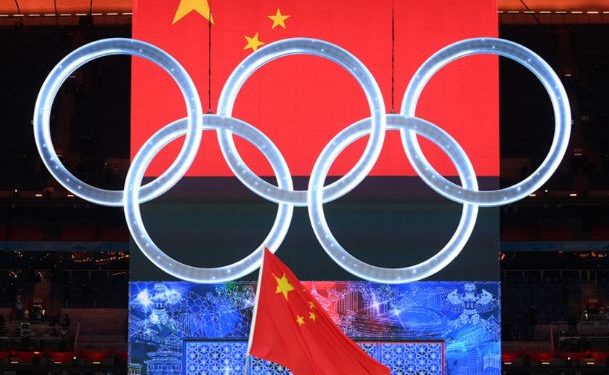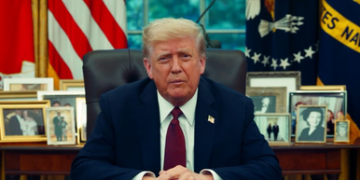Taipei: The post, on China’s Weibo social platform, resembled many others posted by official media during these Olympics — an ode to freestyle skier Eileen Gu, known to Chinese as Gu Ailing.
“The biggest gold medal in Eileen Gu’s heart,” it teased.
Underneath, in the comments from users, came the questions. They were not on topic. They were about something else entirely — a chained woman captured in a viral video 500 miles from Beijing, on the southeastern China coast.
“Can you pay attention to Feng county? Where’s the responsibility of national media?” one user asked. Said another: “Please thoroughly investigate the chained mother in Xuzhou so that every Chinese girl can accept the freedom and power given to them by this great era, just like our Ailing.”
Since January 28, the story of the chained woman who appeared in the video has continued to grow, evading numerous censors both digital and human. Underneath much Olympics coverage — from stories about copyright violations of mascot Bing Dwen Dwen to Gu’s every move — Chinese commenters exhorted national media to highlight the growing scandal.
Even as the original accounts that shared the video disappeared and censors on social media platforms deleted articles and hashtags, amateur sleuths kept the story alive online. Offline, former investigative journalists went reporting on the scene.
“For this incident to have gotten this much attention, it’s only because of netizens calling attention to it that it hasn’t sunk,” said Chase Zhao, an English teacher who has been following the case closely.
It is one case, one woman in a population of 1.4 billion at a moment when the Olympics are commanding a chunk of the national bandwidth.
But as it unfolds, it affords a glimpse into what’s happening in China behind the Winter Games — and how people advocate for causes even in the widely censored, politically fraught space of Chinese social media.
Days before the Lunar New Year holiday began on February 1, a video spread online from a village in Feng county, located in Jiangsu province on the coast. It showed a woman with a chain around her neck.
The chain wasn’t the subject of the video. A blogger had visited the village to show her as an example of a member of a poor rural family that would benefit from donations.
In the video, he offers her a jacket, asking if she’s cold. Her response is unclear The weather outside is zero degrees Celsius (32 Fahrenheit), according to the video, and she is wearing a dirty pink sweatshirt. He puts a child’s jacket on her.
He does not address the chain. Another video by the same blogger shows an interview with the woman’s husband, who proudly says he has eight children with his wife.
The implications were troubling. Was the woman a victim of human trafficking? Was she abused? Why could she not move freely? What was her story? The forthcoming answers did not really address such questions.
On January 28, the county government’s propaganda office said the woman had not been trafficked and was married. She was chained, it said, because of mental health issues. In another statement shortly after, they said she’d been homeless.
Later, the statement changed. The county government said the woman’s name was “Xiaohuamei,” or Little Plum Blossom, and that she had been brought to Jiangsu for medical treatment from a remote part of Yunnan province near Myanmar.
She had been travelling with a woman named Sang from her village who somehow lost her.
On February 10, the city government issued a statement saying it had arrested three people, including Sang, Sang’s husband and the father of the eight children — the first two for human trafficking, the father for illegal detention.
So many discrepancies. But what was the truth? On social media, people weren’t having it. One popular Weibo user, “Jiangning popo,” a police officer in Nanjing, said to his 5 million followers: “I’m so angry I could explode.”
The changing narratives provoked people online into action.
Some created complex charts laying out the differences between each government notice. And as the contradictory answers grew, others took the situation into their own hands.
Two women, known only by their online aliases Quanquan and Wuyi, travelled to Feng county to help Little Plum Blossom. Based on their video and audio posts, they drove around, writing slogans on their car with lipstick to publicize the case while talking to people about the issue. At one point, according to a video posted by Quanquan, police had the slogans scrubbed from their car.
The two never met Plum Blossom, and were barred from entering a hospital where she had been taken when they tried to bring her a bouquet of sunflowers. Later, the bouquet they left behind appeared in a short video segment from state broadcaster CCTV.
When the two stopped posting, others online stepped in asking people to call the police station to find out what happened, fearing they were detained.
Zhao, the English teacher, said she tried calling the police station in Feng County to ask about the two women. A women’s rights activist in Beijing who declined to be named confirmed Friday that they had been detained and were released.
Meanwhile, two former investigative journalists, known by their pen names Ma Sa and Tie Mu, set out to the village in Yunnan that Feng county officials had said the woman came from.
According to an article they published on WeChat, they interviewed village residents who confirmed that someone once called Little Plum Blossom did live there and had been married before. They also reportedly found her sister. But they couldn’t confirm if she was the chained woman.
By this point, many people were chiming in. One Weibo user employed professional editing software to compare faces, grabbing 900,000 views. A WeChat user looked up court records of women in Fengxian county who had been trafficked. Another former journalist posted a marriage license, purportedly from Little Plum Blossom, that someone sent to him — and raised an age discrepancy.
The inconsistencies highlighted a crucial point: No one had the whole story.
“If you place your hope on other people or other organisations, that’s not reliable,” said Yang Jingyao, a 28-year old lawyer in Beijing who said he had been following the case closely. “You have to have your own judgement on an issue.”
If facts were in short supply, emotion was not. And understandably so.
“It evokes a broad sense of frustration and anger and a sense of powerlessness among people when they see government abuses and negligence,” said Yaqiu Wang, a senior researcher at Human Rights Watch. She looks at her WeChat feed lately, she says, and “nobody is talking about the Olympics, but everyone is talking about this woman.”
Little Plum Blossom has not been able to advocate for herself. In the original video that circulated, her speech is impossible to understand. Since then, the only video has come from CCTV, the state broadcaster, with her face obscured to protect her identity. As with tennis player Peng Shuai, who had accused a senior politician of rape, she has not been able to meet with others independently.
Official statistics estimate that as of 2011, more than 16 million people in China had serious mental illnesses. But psychiatric hospitals have only one bed for every 100,000 patients, a rate far below that of other upper middle-income countries. And other care options are scarce, said Zhiying Ma, a professor at the University of Chicago who studies mental health in China.
Little Plum Blossom has been taken to a hospital for now, according to CCTV. And on Thursday, the Jiangsu provincial government said it planned to send a team to investigate. Many online expressed relief. Others, though, were less impressed: Too little, too late, they said.
So the story’s cycle continues — a cycle that churns together fact, rumour, outrage, and the good intentions of ordinary Chinese internet users. Eventually, it will produce results from an official final investigation, monitored closely by a skittish government that shuts down conversations that might reflect poorly on it. The result: an official version of truth.
And while the Beijing Olympics wind to an end, watched by the world in a way this case is not, provincial investigators begin to dig in. As they do, says Ma, the professor, the most vital question remains unanswered:
“What’s the solution? What’s the future for that woman?”
AP







































